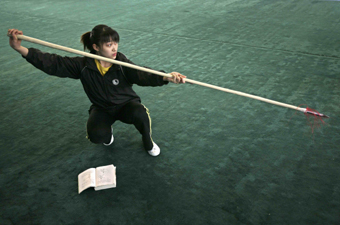East Asian tigers battle to reign supreme in martial arts
(Xinhua)Updated: 2006-11-27 09:22
Japan, South Korea and China are raring to reassert their supremacy in their native martial arts of judo, taekwondo and wushu against increasingly tough competition at the Asian Games.
 A student practices wushu, a traditional Chinese martial arts, at the Shichahai Sports School in Beijing in this April 5, 2006. [File Photo/Reuters]  |
With a record eight Olympic gold medals from Athens, Japanese judokas hope to spring back from their crushing defeat at the world team championships in September.
South Korea, who grabbed 12 out of 16 titles on offer in taekwondo at the last Asian Games on home mats in Busan, take nothing for granted in the face of a serious challenge from Iran, China and Chinese Taipei.
More and more countries are having a share of gold medals in China-born wushu or its Japanese brother, karate, as these centuries-old fighting sports are struggling for a place in the future Olympic programme.
Japanese men's and women's judo teams failed to defend their world titles in Paris, dealing a blow to their preparations for the Beijing Olympics.
The men's squad bowed to hosts France 2-4 in the second round and finished fifth after narrowly losing to South Korea in the consolation round.
Georgia beat Russia in the men's final.
Japan's women finished third along with China behind champions France.
"We have slipped into an air pocket after dashing toward Athens," said Kazuro Yoshimura, head of competitive development at the All-Japan Judo Federation.
"We must accept the defeat and rebuild ourselves by boosting the training load."
He ambitiously set Japan's gold medal target at a clean-sweep of all 16 judo divisions at the Doha Asiad.
"But there will be tough battles ahead because of South Korea as well as Central Asia," Yoshimura said. "If we lose in Asia, we can hardly beat the world."
South Korean judo chiefs are going for three gold medals in Doha.
Since joining the Asian Games family in 1994, Central Asian nations have risen in judo with Uzbekistan and Kazakhstan each picking up one silver and three bronzes in Busan.
Japan have dominated men's judo at the the Asian Games after finishing second to South Korea in 1986 when the sport made its debut.
They grabbed five golds in Busan against two for South Korea and one for Iran.
Yasuyuki Muneta, the 2003 heavyweight (over-100kg) champion, will defend his Asian Games title as he leads the Japanese men's squad which also includes 2005 world middleweight (90kg) champion Hiroshi Izumi.
Izumi is braced for a possible showdown with South Korean rival Hwang Hee-Tae, who won the prestigious Paris tournament this year.
They drew at the world team championships.
"Both Hwang and myself are proud and resolved to win. I must not be crushed by the pressure," said the 24-year-old Izumi.
The South Korean men also include Olympic lightweight (73kg) champion Lee Won-Hee and Olympic light-heavyweight (under-100kg) silver medallist Jang Sung-Ho.
In the women's game, China, Japan, South Korea have battled for supremacy on Asiad tatamis.
In taekwondo, South Korea won seven out of eight men's taekwondo gold medals when the sport made its Asian Games debut in 1986.
The women's contest was not held until 1998.
They won six men's titles, and took six in the women's event.
South Korea will send six men and six women to Doha, aiming to collect at least seven golds.
"We are not complacent," said Kim Moo-Cheon, competition and planning manager of the Korea Taekwondo Association.
"Asian players have considerably improved
their ability and form to narrow the gap. We are especially concerned about powerful Iranian players."The Korean men's squad includes featherweight Song Myeong-Seob, who won the bronze in Athens and the silver at the 2005 world championships.
World bantamweight champion Kim Bo-Hye and welterweight champion Hwang Kyung-Seon are in the women's squad.
China swept all wushu titles in 1990 when the sport was introduced to the regional Olympics.
But in 2002, China won five against two for Thailand and one each for South Korea, Malaysia, Myanmar and Iran
Karate, on the Asiad menu since 1994, is also wide open with Japan taking
three titles in 2002 against two for Malaysia, Iran and Vietnam. Indonesia and
Kuwait won one each.
|
||
|
||
|
|